I have heard mention of the existence of Italian XVIIIe's, but have not been able to track down a picture. Peter Johnsson has described them as being very similar to the Albion Dane but with an Italian flair. If anyone knows where I can find pics of these or even any other vaguely similar Italian two-handed swords from 1450-1520, I would be extremely happy. Thanks.
Here's an early 16th C Venetian XVIIIe from the Burrell Collection.
 Attachment: 101.07 KB
Attachment: 101.07 KB
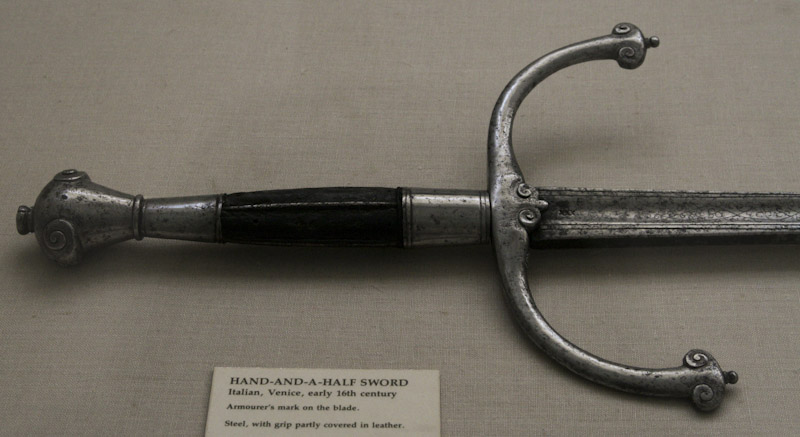
 Attachment: 41.3 KB
Attachment: 41.3 KB



Ryan, thank you, thank you, thank you! That was quick. This is why I love myArmoury. Peter's description of an Albion Dane with an Italian flair really clicks now that I have seen the picture. I find the relatively short grip very interesting, as well as the use of ferrules instead of wire-wrap. Most amazing is the decoration, very reminiscent of some late Roman cavalry swords.
As someone who knows very little about swords of this period outside of basic generalities, could someone explain the functionality of the shape of this weapon, please? is that part near the quillons for grabbing (halfswording), or what?
| Joshua McGee wrote: |
| As someone who knows very little about swords of this period outside of basic generalities, could someone explain the functionality of the shape of this weapon, please? is that part near the quillons for grabbing (halfswording), or what? |
Yes. Whenever you are thrusting with a sword, one of the most important things is that blade must track in a straight, crisp line as much as possible. It is very easy for your arm motion to deviate as you extend forward. Since this blade is made to favour stabs, having the halfsword grip is going to give a lot of extra stability and precision, which translates into better puncturing capacity.
Wow! Now that is beautiful. I didn't have any idea such swords existed! Do you have a close up of where the ricasso joins the blade? I'd love to see how the fullers transition.
Thank you for this picture!
Thank you for this picture!
Mathew, it seems that the ricasso fuller, which is outlined by two scraped lines, terminates rather abrubtly and squarely, then the blade fullers begin a few mm or so further down. Are you familiar with the more well-known Scandinavian version of the XVIIIe or is this your first introduction the XVIIIe's? Most of the Scandi versions have either a simple ricasso fuller only that fades out in the first few cm of the blade or no fuller at all. Hopefully one of us will come up with more examples of Italian XVIIIe's so we can see if the more complex fullers are a typical feature or if this one is exceptional. I really like the combination of long fullers with a later-style blade.
No worries. It's around 50 inches long. It’s quite a striking piece and is on my list of swords to request in a future visit to Glasgow Museums.
There is an almost identical hilt in the Royal Armouries without the narrow ricasso on the blade.
 Attachment: 76.31 KB
Attachment: 76.31 KB

 Attachment: 75.45 KB
Attachment: 75.45 KB
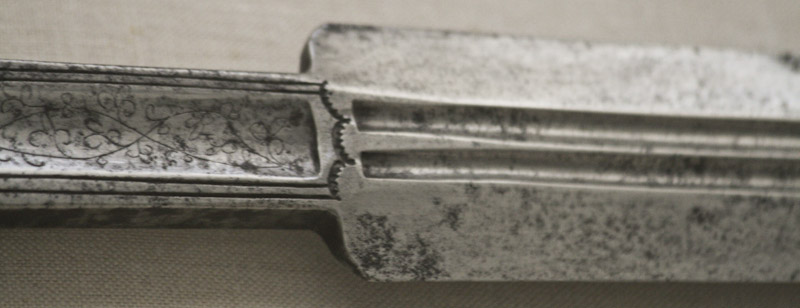
 Attachment: 117.32 KB
Attachment: 117.32 KB
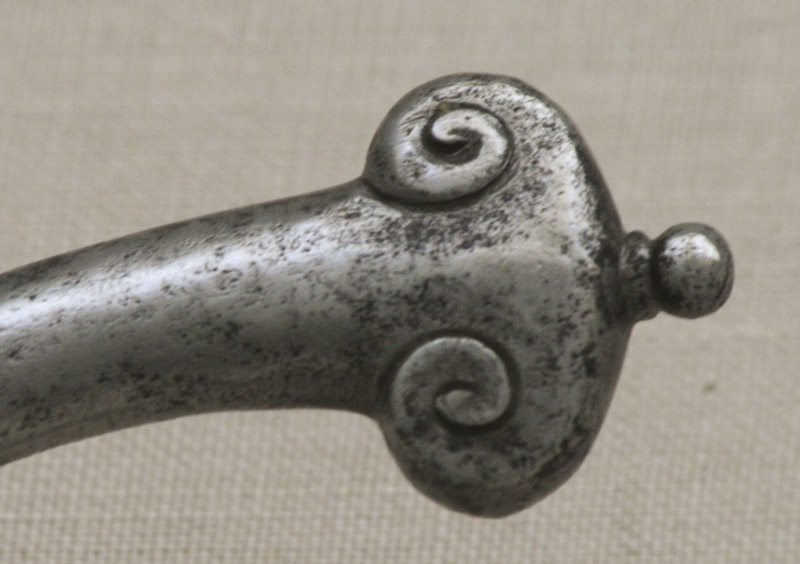
 Attachment: 115.96 KB
Attachment: 115.96 KB
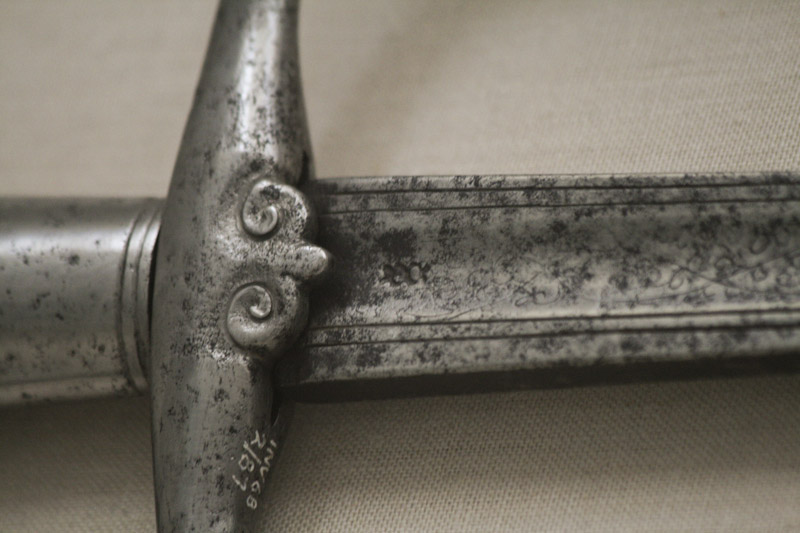
 Attachment: 41.2 KB
Attachment: 41.2 KB

 Attachment: 70.09 KB
Attachment: 70.09 KB
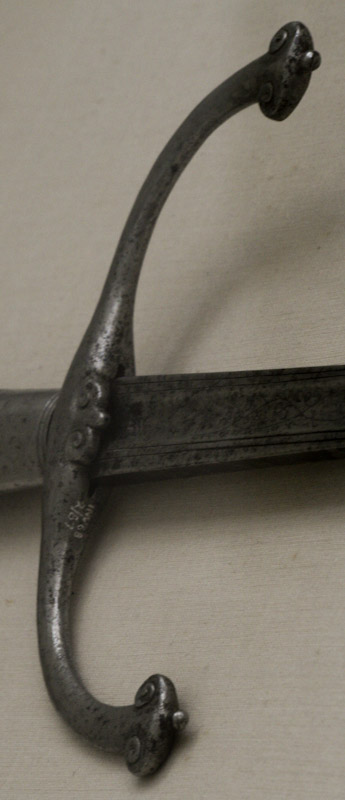
 Attachment: 136.98 KB
Attachment: 136.98 KB
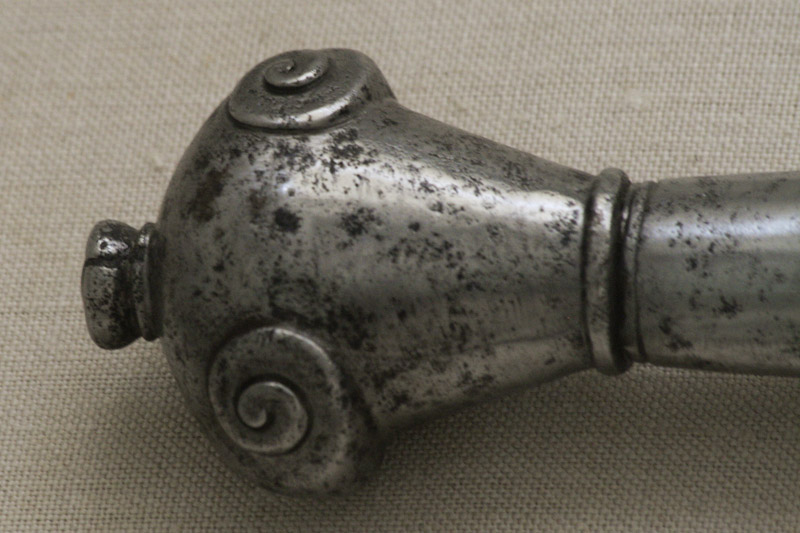
 Attachment: 86.11 KB
Attachment: 86.11 KB
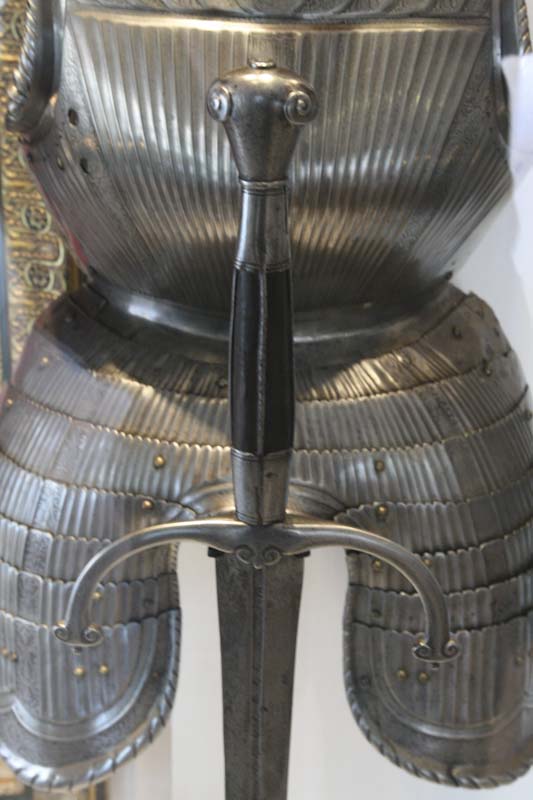
There is an almost identical hilt in the Royal Armouries without the narrow ricasso on the blade.








Ryan, don't take this the wrong way, but I think I love you! No, seriously, thank you so much for all the great pics of this absolutely fascinating sword. The pic of the Royal Armouries example clears something up for me, I was sure I had recently seen this sword but didn't rememmber it being an XVIIIe. Mystery solved!
Hello All,
So is this a common hilting style, maybe specifically Venetian? If so it would be cool to see on a wide range of blade types and sizes... That said, the topic sword is amazing! Those detail shots are great. The fuller arrangements make me think of those complex-hilted German type XIX's, but obviously a very different thing in the end.
-Eric
(edited 'cuz sometimes I don't read the whole thread before I start babbling)
So is this a common hilting style, maybe specifically Venetian? If so it would be cool to see on a wide range of blade types and sizes... That said, the topic sword is amazing! Those detail shots are great. The fuller arrangements make me think of those complex-hilted German type XIX's, but obviously a very different thing in the end.
-Eric
(edited 'cuz sometimes I don't read the whole thread before I start babbling)
@ Scott,
I've seen photos of the Dane, as well as a custom Danish two hander by Tinker Pierce, and then the review of the AT1592 on this site as well. But nothing like this with the "Italian Flare". It's fantastic.
I wonder about the shorter hilt. Also, I'm not quite sold that the ricasso is for half swording, I thought the blade was usually gripped further up, and with the more spike shaped versions, like this example, I wouldn't think the blade too sharp for gripping in this manor. And if it was for choking up with the right hand, why not have flukes?
I love the aesthetics though, thank you for introducing me to a new sub-type!
And Ryan, thank you for those close ups! A fantastic example of a simple element looking like its more complicated than it really is. The accent lines really pull it together. It keeps amazing me that something so brutally efficient can hold such a sculptural appeal.
I've seen photos of the Dane, as well as a custom Danish two hander by Tinker Pierce, and then the review of the AT1592 on this site as well. But nothing like this with the "Italian Flare". It's fantastic.
I wonder about the shorter hilt. Also, I'm not quite sold that the ricasso is for half swording, I thought the blade was usually gripped further up, and with the more spike shaped versions, like this example, I wouldn't think the blade too sharp for gripping in this manor. And if it was for choking up with the right hand, why not have flukes?
I love the aesthetics though, thank you for introducing me to a new sub-type!
And Ryan, thank you for those close ups! A fantastic example of a simple element looking like its more complicated than it really is. The accent lines really pull it together. It keeps amazing me that something so brutally efficient can hold such a sculptural appeal.
Museum Replicas used to sell a Del Tin version of this sword about 2 decades ago. They called it the Renaissance Battle Sword. It came in 2 lengths: one sword was 41 3/4 inches with a 32 1/4 inch blade, and the other was 44 3/8 inches, with a 34 7/8 inch blade. I got one of the shorter ones on ebay a few years ago. The description says the sword is a composite of hilt parts based on a 16th century Italian sword in the tower armouries, and blades by Del Tin. They were not trying to exactly replicate the historical weapon, as the blade was similar to that of the Windlass Long Sword, but they looked nice and had excellent balance.
So here are a few pics I took tonight. Not a photographer, but then its not exactly a museum piece.
 Attachment: 27.33 KB
Attachment: 27.33 KB
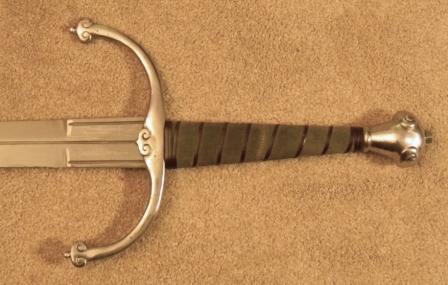
 Attachment: 74.43 KB
Attachment: 74.43 KB
[ Download ]

[ Download ]
It is interesting to see that this hilt has already been replicated. I would love to get my hands on one of those and mount the hilt components on an XVIIIe blade. I am still looking for more original examples, but have not come up with anything yet.
The RA example...with scabbard!
 Attachment: 97.96 KB
Attachment: 97.96 KB
[ Download ]
[ Download ]
Thank you Sean. I find it interesting that both examples with this hilt style have long fullers. The blade shape reminds me a lot of the Hanwei Tinker longsword blade, just with a longer, narrower fuller.
| Scott Woodruff wrote: |
| Thank you Sean. I find it interesting that both examples with this hilt style have long fullers. The blade shape reminds me a lot of the Hanwei Tinker longsword blade, just with a longer, narrower fuller. |
I thought of the HT as well, though I find that blade to be so light that I think I prefer it with a shortened tang and single hand mounting. I'm choosing a design for one of those now.
| Sean Flynt wrote: |
|
I thought of the HT as well, though I find that blade to be so light that I think I prefer it with a shortened tang and single hand mounting. I'm choosing a design for one of those now. |
All to taste, Sean. Early in my wma studies, I used to feel that all the Tinkers were just a bit too light. A few more years of study, and I feel their bastard sword blunts lend themselves very nicely to fine Fiore longsword fencing- the PoB makes them recover and change direction very quickly. The HT longsword blade seems better for a Meyer longsword work, or perhaps as a Renaissance Italian spadone.
Next time I get a blunted Tinker longsword sword blade at a decent price, I may try to replicate the blade in Ryan's pictures. I've kinda fallen in love it, and I think my grinder-fu is good enough to pull off that ricasso. The fullers won't match, but amateur tinkers can't be choosers ;-)
Page 1 of 1
You cannot post new topics in this forumYou cannot reply to topics in this forum
You cannot edit your posts in this forum
You cannot delete your posts in this forum
You cannot vote in polls in this forum
You cannot attach files in this forum
You can download files in this forum
All contents © Copyright 2003-2006 myArmoury.com — All rights reserved
Discussion forums powered by phpBB © The phpBB Group
Switch to the Full-featured Version of the forum
Discussion forums powered by phpBB © The phpBB Group
Switch to the Full-featured Version of the forum